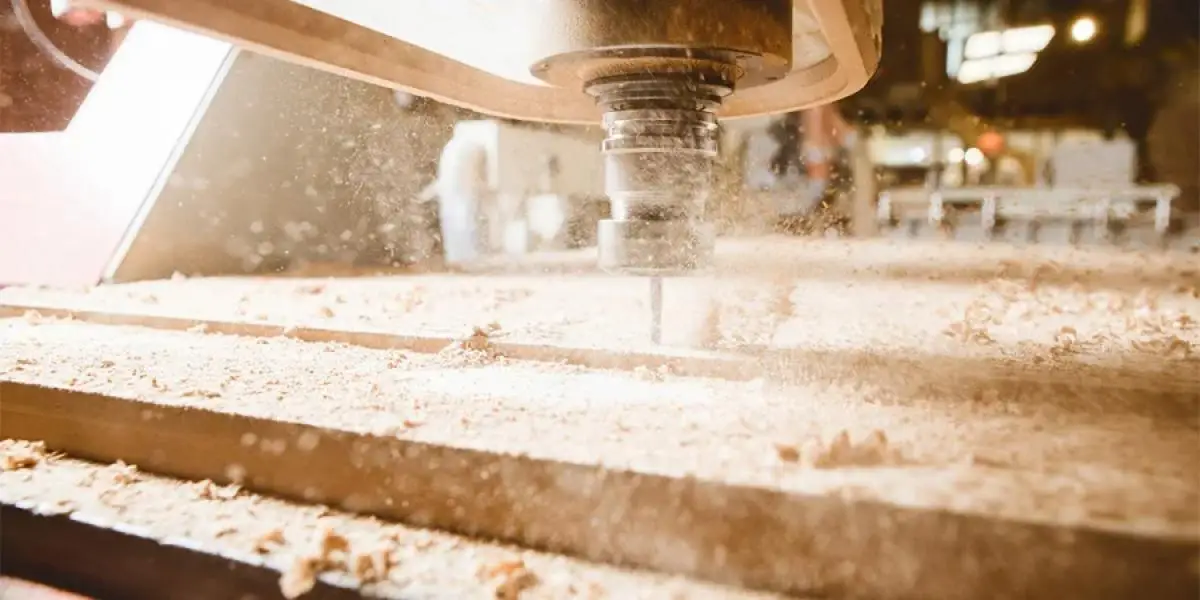A CNC router is a popular tool in modern manufacturing that accurately shapes thin and large workpieces. It is highly repeatable and you can fabricate the same features and designs over and over at a high speed. However, one of the most crucial factors to consider when outsourcing CNC routing service is cost.
The cost of a CNC router service will determine the final price of your parts and competitiveness in the market. As a hobbyist, small business owner, or large-scale manufacturer, it is normal to be curious about CNC router service cost to make informed decisions. This article will explore the key factors that determine the cost of CNC router services and how to cut down expenses.
How Much Does it Cost to Get CNC Router Service
The CNC router cost varies and depends on many factors. On average, it ranges from $75-$150 per hour. Note that it can be less or more than this based on your project requirements. For simple parts, you may pay around $45. The cost for more complex ones can be more than $500 in certain instances. Furthermore, you should know that there are different pricing models for different service providers. Some may use the usual hourly rate and time the operator spends on your project. Conversely, others have a flat rate per piece produced.
Key Factors Affecting CNC Router Service Cost
CNC routing has various aspects that affect service costs. It is important to understand these factors to help you estimate the potential cost of a CNC router service.
Material Type
The type of material directly determines the cost per unit. Most metals and alloys are more expensive than their plastic and polymer counterparts. Additionally, the cost also varies depending on the particular type of metal. Aluminum is cheaper and more readily available than titanium. Hence, the latter will have a higher service cost. Furthermore, the ease of machinability of the material also plays a role. Service providers may charge more for harder materials that are difficult to work on.
Complexity of Design
The complexity of the intended design is another important factor. The design’s intricacies directly affect the time, resources, and expertise one would need to carry out the project. Parts with complex shapes and detailed features will require more time for programming. Very complex ones will need advanced software tools that may be expensive. Furthermore, complex designs take longer to machine and you may need to change tools at intervals. Additionally, the higher the level of intricacy, the higher the risk of errors. Many service providers factor this risk into their pricing.
Production Volume
The number of parts you want to manufacture will affect the overall cost of production. Most times, the unit cost of the parts reduces as the production volume increases. There are many reasons for this. A CNC router requires a single setup and can run unattended for hours. For small batch production, the cost of programming and setup is more significant. Meanwhile, the set-up cost gets distributed across many parts in mass production which makes unit cost less expensive. Furthermore, bulk purchases of materials can lead to significant cost savings because of discounts. This results in a reduced material cost per unit.
Finishing Requirements
Post-processing may be required for parts when the as-machined finish is not suitable for aesthetics and functionality. However, many of these post-processing techniques are expensive and impact the overall manufacturing costs. To achieve a high-quality finish, the parts have to go through multiple processes which can increase labor time. An increase in labor and production time directly increases cost and service price. Furthermore, if your project needs specialized or custom finishes, it will further add to your expenses.
Location of the Service Provider
When carrying out CNC routing operations, you can either use a local or online service provider. Based on the location of the manufacturer, the cost of transportation and shipping differ. The logistics cost of a local manufacturer will be relatively cheaper than when you order from another country or continent. Furthermore, different manufacturers have distinct ways of calculating cost. Hence, the quote you get from one may be significantly different from another. Additionally, some regions have higher tax fees and import duties than others.
Turnaround Time
The time required to complete your project from start to finish will also determine the overall cost. Urgent and time-sensitive projects may cost more. This is because the service provider may need to rearrange the team’s schedule to accommodate yours. This prioritization will inevitably increase production costs. Furthermore, when your project has a tight deadline, the manufacturer may need more hands-on ground. Working overtime or hiring additional staff will increase labor intensity and cost.
How to Cut Down CNC Router Service Cost
The following are some strategies you can employ to reduce CNC router service costs.
Optimize Design for Manufacturability
You should carefully evaluate your design from the manufacturing perspective. It may include simplifying geometry and minimizing complex features to increase manufacturing efficiency. Furthermore, consider optimizing tool paths by avoiding sharp corners and deep cavities. All these will help reduce setup and cycle times.
Use Existing Tooling
If possible, use the available tooling and router bits. Custom-made and specialized bits can be expensive to manufacture. Aside from the manufacturing cost, it can also increase turnaround time and result in your products getting to market late. Furthermore, the operators may not be familiar with the new tools. This unfamiliarity will increase the time needed to configure the new tools and get the operation running.
Choose Soft Materials
Consider going for soft and cost-effective materials when you want to use a CNC router service. This machine works best with wood and plastics. However, recent technological advancements have made it possible to machine hard metals with CNC routers. Note that these specialized machines are expensive and machining tough metals requires careful consideration.
Be Liberal with Tolerances
Tolerances are important if the parts you want to manufacture will be further assembled to make a whole. However, very tight tolerances will increase CNC router service costs significantly. Extreme accuracy and precision increase machining and inspection time. For this reason, specify tight tolerances only for dimensions and features required for functionality.
Avoid Multiple Surface Finishes
Using multiple post-processing techniques will increase the unit cost of the part. When using a CNC router service, limit the number of surface finishes to one or two. Fewer finishing techniques will streamline workflow and speed up production. Additionally, you can be sure of reduced setup and labor costs.
Leverage Economies of Sales
Another way you can cut down CNC router service costs is to maximize economies of sales. This entails increasing sales volume to spread costs associated with equipment, labor, and programming. Furthermore, increasing the number of parts to be produced improves negotiation power. You can request better rates for raw materials, logistics, and associated services.
Provide Detailed Specifications
Though this factor does not directly reduce cost, it also counts. Before production begins in full, communicate all your needs to the team and ensure everyone is on the same page. This will reduce the incidence of errors and misinterpretations. Errors in manufacturing may lead to the production of parts that need reworking leading to additional costs.
Conclusion
The cost of CNC router service varies considerably. It can be as low as $50 per hour while some may exceed $500. This wide price range depends on many factors including the type of material, design complexity, production volume, and finishing requirements. However, there are ways you can cut costs and produce affordable parts and components. To go about this, optimize design for manufacturability, use tight tolerances only when necessary, leverage economies of sales, and use the right CNC router service provider.
Keep an eye for more news & updates on WebOfBuzz!




